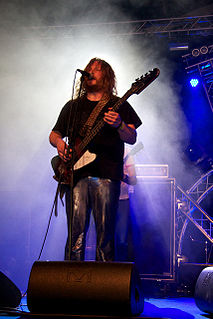A Quote by Ben Marcus
RHETORIC The art of making life less believable; the calculated use of language, not to alarm but to do full harm to our busy minds and properly dispose our listeners to a pain they have never dreamed of. The context of what can be known establishes that love and indifference are forms of language, but the wise addition of punctuation allows us to believe that there are other harms - the dash gives the reader the clear signal they are coming.
Related Quotes
I watched the gorilla's eyes again, wise and knowing eyes, and wondered about this business of trying to teach apes language. Our language. Why? There are many members of our own species who live in and with the forest and know it and understand it. We don't listen to them. What is there to suggest we would listen to anything an ape could tell us? Or that it would be able to tell us of its life in a language that hasn't been born of that life? I thought, maybe it is not that they have yet to gain a language, it is that we have lost one.
Being a slow reader would normally be a deficiency; I found a way to make it an asset. I began to sound words and see all those qualities - in a way it made words more precious to me. Since so much of what happens in the world between human beings has to do with the inconsideration of language, with the imprecision of language, with language leaving our mouths unmediated, one thing which was sensuous and visceral led to, in the use of language, a moral gesture. It was about trying to use language to both exemplify and articulate what good is.
Language both reflects and shapes society. Culture shapes language and then language shapes culture. Little wonder that the words we use to talk to each other, and about each other, are the most important words in our language: they tell us who I am, they tell us who you are, they tell us who 'they' are.
The language of the heart--the language which "comes from the heart" and "goes to the heart"--is always simple, always graceful, and always full of power, but no art of rhetoric can teach it. It is at once the easiest and most difficult language--difficult, since it needs a heart to speak it; easy, because its periods though rounded and full of harmony, are still unstudied.
I sing only in Meronian - my own language - but there are also elements of English and Finnish languages in our songs. When we use the spiritual Meronian language, the word 'international' doesn't do justice to our band. This kind of psychic language's means of communication can reach galaxies beyond our planet, not to mention the other living and inanimate entities of our own planet.
Some feminist critics debate whether we take our meaning and sense of self from language and in that process become phallocentric ourselves, or if there is a use of language that is, or can be, feminine. Some, like myself, think that language is itself neither male nor female; it is creatively expansive enough to be of use to those who have the wit and art to wrest from it their own significance. Even the dread patriarchs have not found a way to 'own' language any more than they have found a way to 'own' earth (though many seem to believe that both are possible).



































